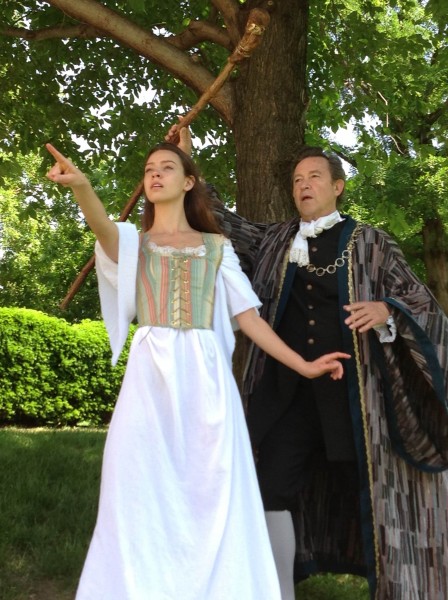Sassy, A Little Trashy, and Just In Time for Summer: It’s the Remake of the Remake of “The Tempest”
You realize, of course, that you cannot do summer theater properly unless you catch a remake. Of Shakespeare, that is. Altered Shakespeare is red-hot everywhere this year. In Chicago, for instance, they’ve got Othello: the Remix, the latest “add-rap-tation” by The Q Brothers; and New York has a new musical based on Love’s Labour’s Lost (with songs like “Love Is a Gun”) …
But while those big-city lights will see strange sights, the strangest you ever will see is right here in Pittsburgh, through June 29. This one is The Tempest, or The Enchanted Isle. The opening-night audience was howling with laughter by the middle of the first scene. The play is a modern remake of a very bizarre 346-year-old remake of The Tempest. (Yes, people were doing such things back in 1667, playing fast and loose with Shakespeare barely 50 years after the man was in his grave.)
And this twisted Tempest is performed in suitably skenky fashion by Pittsburgh’s own bard-benders, the Unseam’d Shakespeare Company. “Skenky?” After the show—in the hallway outside the Studio Theatre in the Cathedral of Learning—I saw two young women from the audience who clearly had been amused. So I asked them what they liked about this bastardized Tempest. Said one, “It’s skenky.” Which is London slang for what we Yanks would call “sassy and rather trashy.” This, in turn, was certainly the spirit of the times back in 1667.
Where on Earth Did This Play Come From?
The Tempest, or the Enchanted Isle was written by the two big Ds of the day, William D’Avenant and John Dryden, during the time in English history known as the Restoration. That period, far from being as dull as it sounded when you first learned about it in school, was in fact more like the Repeal of Prohibition meets the Sixties.
Prior to the 1660s, the Puritan ethic held sway in London. For nearly 20 years all theaters were closed. The king, Charles I, was beheaded and replaced by Puritan-inspired forces led by Oliver Cromwell. Then, in 1660, the Cromwell coalition came apart. The late king’s son, Charles II, returned from exile. And it was party time. Charles II, known as the “Merry Monarch,” set a new tone, fathering 12 children, none legitimate. Taverns and coffee houses flourished. As theaters reopened, a racy new genre of Restoration comedy emerged, and it was equal-opportunity racy because women at last were allowed to act on stage. (Previously their roles had been played by cross-dressed men or boys.)
Whereupon D’Avenant and Dryden decided to update Shakespeare’s The Tempest for the new age. The version they wrote became an instant hit, more popular than the original, and it remained the version that most people knew until the mid-1800s. In 2011 it was streamlined and tweaked by the Oregon dramatist Scott Palmer, producing the play you can now see at Unseam’d.
Restoration + Python + Blackadder
The basic plot setup of the re-revision is much the same as Shakespeare had it. Prospero (Ron Siebert), once the Duke of Milan, has been usurped and stranded for many years on a remote island. Stranded with him is his daughter Miranda (Colleen Pulawski), now grown into a virginal beauty. Prospero is a learned man, who has acquired the skills of a powerful conjurer. Aided by his fairy servant Ariel (Kevin Donohue, bare-chested and trimmed in feathery blue), Prospero conjures up a storm to cause a shipwreck. All aboard survive the wreck, and those who scramble ashore include a prized catch: the villainous present Duke—the usurper—with various fellow travelers. Now our hero and his supernatural sidekick can play their magic tricks upon the lot of them as they wander, in scattered groups, across the Enchanted Isle.

Serious business? Not here. It’s Miranda (Colleen Pulawski) espying a MAN, while father Prospero (Ron Siebert) casts a spell, in a play that’s “Restoration comedy with overtones of Monty Python and Blackadder.”
And the rest is bawdy bedlam. It turns out that D and D took extreme liberties with Shakespeare’s script. Here Miranda has a sister, Dorinda (Claire Chapelli), who, like her, has never seen a man other than dear old dad. The savage half-beast Caliban (Thomas Constantine Moore) has a savage sister, too, named Sycorax (Jennifer Tober)—which means more parts for women! Gone, meanwhile, are elements such as the two subplots in which assorted characters are scheming to assassinate Prospero and the shipwrecked king Alonzo (Connor McCanlus). In Restoration England, regicide wasn’t funny!
Much of the fun comes from the additional new elements. One of my favorite scenes is Ariel putting the usurper Duke (Marc Epstein) and his gang into a frightened trance with the “Guilt” song. To behold Ariel trilling “guilt, guilt” as he prances about them is a wondrous thing, not only humorous but somehow sublime.
Also, the sexual scheming and related folderol have been multiplied vastly. In addition to women who’ve never seen a man, we now have a man, Hippolito (Nick Benninger), who’s been kept in seclusion and has never seen a woman. His naïve eagerness upon learning of the existence of such creatures—and learning, moreover, that the world contains millions of them—provides, um, well … let’s just say it provides an interesting counterpoint to the behavior of Caliban’s wild sister, when she discovers men.
Adding further comic dimensions are the misadventures of Miranda, her swain Ferdinand (Nicholas Browne), and the rest of the troupe. Together they pull off what director Michael Hood says was his vision for a true Restoration comedy, with overtones of Monty Python and BBC’s “Blackadder.”
The Past, the Future
You will not find in this play the same deeper meanings that shimmer within Shakespeare’s Tempest, since D’Avenant and Dryden changed it so much. The director, however, says he and the cast saw the play as reflecting its time, and tried to execute it accordingly. The actors wear period costumes, not modern dress. They also declaim and pose and bow to the audience—not just trying to naturally “be” the characters, as most modern-day actors do, but often acting like they’re acting. Hey, it works.
And here is another thing that works: Unseam’d Shakespeare. Now in its 20th season, Unseam’d gives this city what every major-league city should have: a dedicated Shakespeare company. A good one, thanks to founder and artistic director Laura Smiley and her new associate, Andy Kirtland.
If you haven’t seen Unseam’d, or haven’t seen them in a while, why not now? They do quite a job with the current production. Furthermore your patronage may help assure that we have Unseam’d for another 20 years, might it not? Now that’s an offer that even the Duke of Milan couldn’t refuse.
Closing Credits
The cast also features Andrew Miller as Gonzalo, and Brett Sullivan Santry, Charles Beikert, and Michael Perrotta as the motley crewmen of the shipwrecked vessel. As a certain Stooge would say, they’re poifect.
The Tempest or The Enchanted Isle plays Wednesdays-Saturdays at 7:30 PM and Sundays at 4 PM (plus a closing 8 PM show) through June 29, at the Studio Theatre in the second basement of the Cathedral of Learning, Oakland. Tickets at <http://unseamd.com/box-office/>.
Mike Vargo, an experienced, longtime writer based in Pittsburgh, has himself performed on stage but “not very well,” he says. So he sticks to writing about it.
Photos courtesy of Unseam’d Shakespeare Company and Andy Kirtland
Share on Social Media
Follow Entertainment Central
Latest Stories
Sign up for the EC Newsletter







